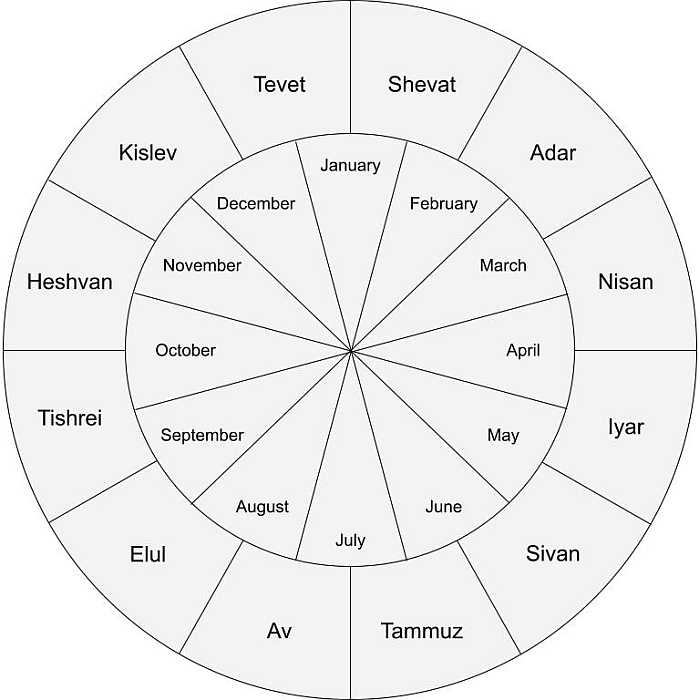
Jewish calendar wheel - Eden Aviv, CC0, via Wikimedia Commons
Embark on a journey that skillfully blends the essence of travel with the time-honored rhythms of the Jewish/Hebrew calendar. For those who follow kosher practices and hold Jewish traditions close to their hearts, understanding the intricacies of this singular calendar is not just enlightening; it's a crucial element of travel planning. This guide is crafted to simplify the complexities of the Jewish calendar, a vital component of Jewish life, offering practical tips for aligning your travels with its significant dates and age-old customs.
The Jewish calendar, with its elegant interplay of lunar and solar cycles, is more than a mere tool for marking time. It is intricately linked with the realm of Jewish cultural and religious practices. Getting a handle on this calendar's nuances is essential for syncing your travel plans with the unique cadence of Jewish festivals and holy days. Each observance, from the jubilant celebration of Purim to the introspective moments of Yom Kippur, holds profound significance, shaping not only spiritual practices but also the practical aspects of travel for those who observe.
Through this guide, we'll shed light on the core aspects of the Jewish calendar and explore how its distinctive structure influences not just major holidays but also the daily lives of Jewish communities. We'll guide you through both the challenges and joys of planning vacations around Jewish holidays, providing key insights and handy tips for the kosher traveler. Whether you're looking to fully engage in the celebrations of Jewish holidays in new locations or aiming to maintain your kosher practices while on the road, this guide is your passport to a fulfilling journey.
Join us as we delve into the depths of the Jewish calendar, unraveling its secrets and learning how to seamlessly incorporate its observances into your travel experiences.


Phases of the moon (Photo: Envato)
Basic Principles of the Jewish Calendar
The Jewish calendar is an exquisite blend of lunar and solar systems, a calendar that not only marks time but also connects deeply with Jewish heritage and religious practices. Understanding its basic principles is essential for anyone planning kosher travel, as it affects everything from holiday dates to daily rituals.
The Lunar-Solar Nature of the Jewish Calendar
At its core, the Jewish calendar is lunisolar. This means it relies on both the moon's phases and the sun's position to mark time. The months are lunar, beginning with the new moon. Each month lasts either 29 or 30 days, aligning closely with the 29.5-day lunar cycle. This lunar structure imbues the calendar with a rhythm that resonates with the natural world.
However, purely lunar calendars (like the Islamic calendar) drift significantly from the solar year. To align with the agricultural and seasonal cycles crucial to many Jewish festivals, the Jewish calendar integrates solar elements. The goal is to ensure that holidays like Passover, which is intrinsically tied to spring, always occur in the appropriate season. This interplay between sun and moon creates a calendar that is both rhythmically natural and precisely tuned to the needs of Jewish ritual and life.
Jewish Months and Their Names
The Jewish calendar consists of twelve months during a common year, with an additional month added in a leap year. The months, with names mostly derived from ancient Babylonian, are as follows:
- Nisan (March-April)
- Iyar (April-May)
- Sivan (May-June)
- Tammuz (June-July)
- Av (July-August)
- Elul (August-September)
- Tishrei (September-October)
- Cheshvan (October-November)
- Kislev (November-December)
- Tevet (December-January)
- Shevat (January-February)
- Adar (February-March)
In leap years, an additional month called "Adar II" is inserted after Adar, extending the year to 13 months.
Leap Years in the Jewish Calendar
The Jewish calendar employs a 19-year cycle with seven leap years, each featuring an extra month. This system, known as the Metonic cycle, effectively synchronizes the lunar months with the solar year. The extra month, Adar II, ensures that festivals remain in their proper seasons, particularly the spring festival of Passover.
In a leap year, certain celebrations and traditions are observed in the second Adar, to maintain the calendar’s alignment with both lunar and solar cycles. This addition of a month every two to three years is a fascinating blend of astronomical observation and religious tradition, ensuring the calendar remains a relevant and living part of Jewish life.


Some people spend the holidays at Sukkot programs or Passover programs on the beach (Photo: Envato)
Planning Vacations with Jewish Holidays in Mind
When making travel plans, considering the Jewish calendar is crucial, especially for those adhering to kosher practices and wishing to honor Jewish traditions. Each holiday in the Jewish calendar is not only a time for spiritual reflection and celebration but also comes with practical aspects that can significantly impact travel plans.
Jewish holidays follow a specific timing based on the lunar-solar calendar, and their dates vary each year in the Gregorian calendar. This variability is a critical factor to consider when planning vacations. For instance, holidays like Passover, Rosh Hashanah, and Yom Kippur might influence your travel dates, accommodation options, and activities. For example, during Passover, the requirement for kosher-for-Passover food can affect your dining options. Similarly, on holidays like Sukkot, finding accommodations that provide or allow access to a sukkah is important. When planning a vacation around these times, research and preparation are key to ensuring that these needs are met.
Celebrating Jewish holidays abroad can offer a unique perspective on Jewish cultural and religious practices. Each community has its own customs and traditions, which can enrich your understanding and experience of the holiday. It's an opportunity to see how different Jewish communities around the world observe the same holiday, often with their unique local customs.

Make sure there is a sukkah nearby when traveling during Sukkot (Photo: Shutterstock)
Embracing the Journey with the Jewish Calendar
The Jewish calendar invites us to view travel through a unique lens. By aligning our journeys with its cycles, we do more than visit new places; we engage with our heritage in a dynamic way. It's about finding balance – respecting age-old practices while embracing the adventures that new destinations offer.
This guide serves as more than just an informational resource; it's a reminder of how travel can be enriched by our cultural and spiritual roots. The Jewish calendar offers a framework that goes beyond the conventional, allowing us to infuse our trips with deeper meaning and connection.
As you look ahead to your future travels, consider the Jewish calendar not just as a planning tool, but as a companion that links your adventures to the enduring rhythm of Jewish life. May this understanding inspire your journeys, leading you to experiences that resonate not only with your faith but also with the culture that defines us.
Here's to journeys filled with discovery and reflection, guided by the timeless flow of the Jewish calendar. May your travels bring not only joy and excitement but also a deeper connection to the rich heritage that accompanies us wherever we go.